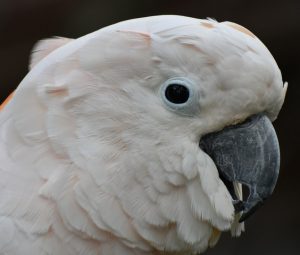 A developing illness or a problematic health issue begins with telltale signs that can alert you that something isn’t quite right. Whether that body belongs to a person, animal, reptile, bird, or even plant or insect, all maladies that afflict our highly complex system of existence start out with usually unnoticeable detail — like a cough. Learning to pay attention to these small signs can go a long way in treating and hopefully averting something that could be dangerous and maybe even fatal.
A developing illness or a problematic health issue begins with telltale signs that can alert you that something isn’t quite right. Whether that body belongs to a person, animal, reptile, bird, or even plant or insect, all maladies that afflict our highly complex system of existence start out with usually unnoticeable detail — like a cough. Learning to pay attention to these small signs can go a long way in treating and hopefully averting something that could be dangerous and maybe even fatal.
Birds can exhibit similar symptoms of developing health issues that we do, but sometimes in different ways. The cough can signal the arrival or worsening of a developing respiratory problem. Typically, a cough is the body’s attempt to clear a pathway. For humans, that is a completely different method. The respiratory system of a bird consists of two lungs, and connected air sacs. It is said that this avian system is an efficient one, more so than that of a mammal. The explanation for this is a complex one and deserves further investigation for you to fully understand the working of your bird’s breathing rhythms. (Start here.) It is equally important to recognize when that system is not working properly for the sake of the bird’s health and comfort. So, what should you recognize?
What’s Behind the “Cough?”
Infections that affect a bird’s lower respiratory tract (lungs, air sacs) can cause a bird to make sounds similar to coughing. A bird’s “cough” may not be immediately recognized for what it is. A bird’s cough can sound like another chirp. Birds lack a diaphragm, so a bird’s cough does not sound like ours. There are many, many illnesses that can afflict a bird’s respiratory system. Many of these can be alerted to by a cough. However, your avian vet should be able to recognize the cough of a bird as well as other symptoms that might make it past your own inspection.
Other Signs Of Trouble
Even if there are no telltale sounds or other alerts of developing sickness, it is always a good thing to be proactive in watching for declines. Weight loss is subtle at first. It is suggested to use a scale to monitor your bird’s daily weight. A 10% reduction could be a sign of concern and warrants a visit to your vet for evaluation. Monitor their excrement for unusual signs like green or red colors, and consistency. Breathing should not be labored and nostrils should be free of discharge. An additional sign of labored breathing is movement of the tail up and down (tail bobbing). The bird’s feathers should not be dull. A notable departure of behavior could also signal the onset of sickness.
In all of these cases, take the bird to your avian vet. Remember, birds hide their illness for as long as possible, so a display of sickness means that the cause of it is already advanced. Be alert and watch out for your bird.
Bear in mind that a bird might cough as an allergic reaction to items in the house. Things like air fresheners, cooking items, candles, and a collection of numerous other things could create a bad situation for your beloved bird. Your bird is a complex creature that has a very different internal setup than we do. It does well for you to understand the signs — like recognizing what a cough in a bird sounds and looks like.
